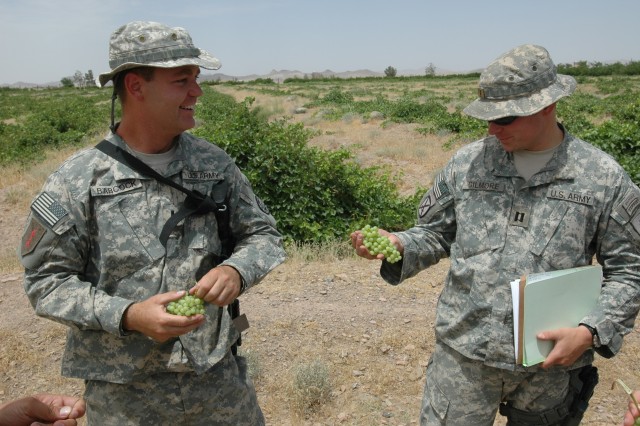SHINDAND, Afghanistan (Army News Service, July 31, 2007) - Afghan and international forces are trying to solve Afghanistan's poppy problem and maximize legitimate agricultural food crops.
First Lt. Gris Babcock of the 207th Regional Security Assistance Command here may have found a way to help.
1st Lt. Babcock has started an agricultural research center to develop crops other than poppies.
The Afghan poppy trade produces most of the world's opium, and the resulting illegal drug trafficking helps to finance the Taliban and other enemies of the government. Efforts to combat the problem include helping farmers in the impoverished nation learn economically viable alternatives.
An employee of the U.S. Department of Agriculture in his civilian job, 1st Lt. Babcock also serves as a member of the Idaho National Guard so he applied his knowledge to develop the center. The center is remarkably comprehensive, with laboratories, classrooms and even fish ponds with hatcheries. It includes beehives, vineyards and orchards. When completed, it will even have a weather station.
Officials have begun work on 10 acres of orchards that will include apricot, plum, almond, pomegranate, mulberry, and wild pistachio trees. The next step for the orchards is to install a drip irrigation system. The saplings from the orchards will go to surrounding villages to start their own nurseries. Though the villages will be cultivating the nurseries, they will be under the auspices of the center.
Another 10 acres will be used to grow six different varieties of grapes. Grapes had been all but wiped out by the Taliban because they could be used to produce wine.
"Grapes are lucrative and require very little summer watering, which make them an ideal crop. With the introduction of trellising, yields will increase at least 60 percent in this ideal climate," 1st Lt. Babcock said. "The key is to teach trellising and pruning techniques, which are virtually unknown in this country."
The grapes will be sold as fruit and as raisins.
Saffron also will be introduced. This crop is the most promising to replace the poppy crop as a cash crop, officials said. It will be grown first at the center and then move to surrounding villages.
"The main hold-up right now for the saffron is signing with a good export company in Herat, but we should have one soon without much difficulty," 1st Lt. Babcock said.
The fish ponds will be virtually self-sufficient, with waste water used to fertilize the plants. A small-scale, sustainable, warm-water fish hatchery will be built for grass carp.
"Currently the fish market in Herat is completely under-supplied, though demand is huge. Our goal will be to link five ponds in the villages. This obviously is very site-specific, but can be done with the abundance of irrigation ditches," 1st Lt. Babcock said.
"Grass carp eat everything, particularly grass, which will grow in wet, muddy pond bottoms in two weeks here," he said.
1st Lt. Babcock explained that the fish are induced to spawn by raising and lowering water levels. The effort will begin with only two spawning pairs. The high productivity of the pairs allows the initial breeding stock to be relatively low. After the drawdown -- during which the water will irrigate crops, adult fish will be removed and fingerlings can mature. "Soon, the fish can be taken to market in coolers filled with ice, or eaten locally," he said.
Additionally, honey production will begin at the station and at the village nurseries on a smaller scale. "This is a highly lucrative crop, and has the added benefit of increasing crop production," 1st Lt. Babcock said.
"Currently, the honey available here is a low grade that comes from Iran," he said. "We will purchase all the equipment, and the agriculture department will bring down a trainer for a course. At the station, a small bottling room will be available for the station's production and for locals if they want to use it."
When complete, this project will be controlled by Afghans, taught by Afghans and worked by Afghans, U.S. officials said.


Social Sharing